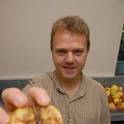Article
Host shift to an invasive plant triggers rapid animal hybrid speciation.
Nature
(2005)
Abstract
Speciation in animals is almost always envisioned as the split of an existing lineage into an ancestral and a derived species. An alternative speciation route is homoploid hybrid speciation1 in which two ancestral taxa give rise to a third, derived, species by hybridization without a change in chromosome number. Although theoretically possible it has been regarded as rare1 and hence of little importance in animals. On the basis of molecular and chromosomal evidence, hybridization is the best explanation for the origin of a handful of extant diploid bisexual animal taxa2,3,4,5,6. Here we report the first case in which hybridization between two host-specific animals (tephritid fruitflies) is clearly associated with the shift to a new resource. Such a hybrid host shift presents an ecologically robust scenario for animal hybrid speciation because it offers a potential mechanism for reproductive isolation through differential adaptation to a new ecological niche7. The necessary conditions for this mechanism of speciation7 are common in parasitic animals, which represent much of animal diversity8. The frequency of homoploid hybrid speciation in animals may therefore be higher than previously assumed.
Keywords
- Speciation,
- Hybridization
Disciplines
Publication Date
July 1, 2005
DOI
10.1038/nature03800
Citation Information
Dietmar Schwarz, Benjamin M. Matta, Nicole L. Shakir-Botteri and Bruce A. McPheron. "Host shift to an invasive plant triggers rapid animal hybrid speciation." Nature Vol. 436 Iss. 7050 (2005) p. 546 - 549 Available at: http://works.bepress.com/dietmar_schwarz/19/
